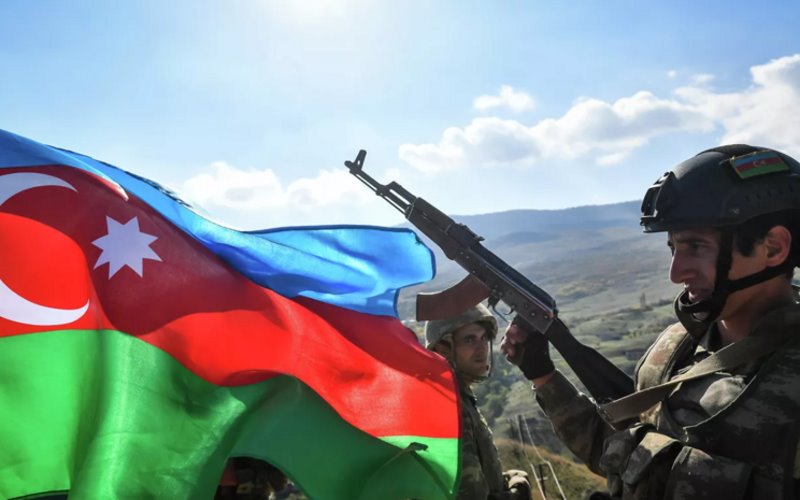By agreeing to surrender their weapons, Armenian rebels in the Karabakh region of Azerbaijan have ended their attempt to create a breakaway state. Although a so-called ‘frozen conflict’ enabled them to hold out for decades, their final defeat was swift, sudden and ultimately inevitable in the face of Azerbaijan’s determination to reassert sovereignty over its sovereign territory, writes Political Editor Nick Powell.
Even frozen conflicts do not last for ever. Russia, the United States and the European Union should have been shaken out of their complacency in 2020, when Azeri forces liberated all parts of their country that had been under Armenian occupation, with the exception of part of Kararabakh.
This mountainous and beautiful region, considered to be the Azeris’ cultural heartland, has long had Armenians living there. But it had always been recognised as part of Azerbaijan, both by the Soviet Union and by the entire international community after independence from Moscow.
Ever since the fighting in 2020, Azerbaijan has been entirely clear that it would not accept any alternative to the complete reintegration of the whole of Karabakh. But just as it had suited Russia, the United States and the EU to tolerate the occupation of Azeri territory for decades, so the same complacency returned after the conflict. Any wish for true peace was outweighed by the misguided belief that it was enough to avoid all-out war.
It is tempting to observe that when all three are in agreement, that’s all one needs to know to realise that a situation is unsustainable and probably just plain wrong. However, it’s worth noting their motives. In Russia’s case it was a wish to maintain influence in the South Caucasus by providing peacekeeping forces. For the United States, there was an opportunity to cultivate Armenia and undermine Russian influence.
The European Union’s approach could be described as more nuanced, if one was being very polite. Divided and confused would be another way of putting it. The President of the European Council, Charles Michel, found a role as an honest broker, hosting a series of meetings between President Ilham Aliyev of Azerbaijan and Prime Minister Nikol Pashinyan of Armenia.
Speaking to me and other journalists in the liberated city of Shusha in July, President Aliyev was kind enough to praise President Michel’s “supplementary and supportive” efforts, even as the Russian and American processes, so essential to avoiding further conflict, were undermined by their rivalry for influence in Armenia.
The EU did itself no favours when its High Representative, Josep Borell, responded to the renewed fighting by not merely calling for a cessation of hostilities but demanding that Azerbaijan “stop the current military activities”, without similarly addressing the armed actions of rebel forces supported by Armenia.
The Azeri Ministry of Foreign Affairs deplored the EU statement and defended its right to respond to military provocations and terror attacks by illegal Armenian armed forces. Azerbaijan’s Ambassador to the European Union, Vaqif Sadiqov, pointed out that hostilities were being ceased though the elimination of Armenian military outposts and installations.
He warned that although the Azerbaijan army’s counter-terrorism measures were of limited scope after deadly attacks against Azeri police and civilians, the Armenian military had to lay down their arms and surrender “or face the consequences”, adding that this was as true for Azerbaijan as it would be for any other country facing a similar threat to its sovereignty.
A ceasefire after 24 hours means that the death toll could be less than 100 on both sides, a figure that will probably be exceeded by the casualties from the millions of mines that the Armenians planted in and around Karabakh. They have been unable -or unwilling- to provide accurate maps of the minefields.
Prime Minister Pashinyan cuts a forlorn figure. Defeated when Azerbaijan liberated most of the occupied territory in 2020, he has explicitly recognised that Armenia has no legitimate claim to Azeri territory and implicitly that his country has run out of allies in aiding the rebels.
But for as long as the world, in the shape of Russia, the US and EU, saw no need to tell him that the game was up and that a so-called frozen conflict (actually involving escalating tension) couldn’t be spun out for a few more years. In such circumstances, he could never persuade the Armenian people, let alone the rebels in Karabakh, that it was time to negotiate a peace treaty.
For Azerbaijan, the challenge now is to successfully reintegrate its Armenian population, though some may prefer to leave. For the EU in particular, it’s time to not just seek a stable partner in Azerbaijan as a supplier of oil and gas but to support stability and peace throughout the South Caucasus.
It’s a region of crucial importance both in its own right and as a trade route between Europe and Asia. A peace treaty, with the reopening of borders to trade and cooperation, is a prize that will take patience and perseverance; though better that form of patience than tolerating a frozen conflict for decades, quietly hoping that it would never end.


















































